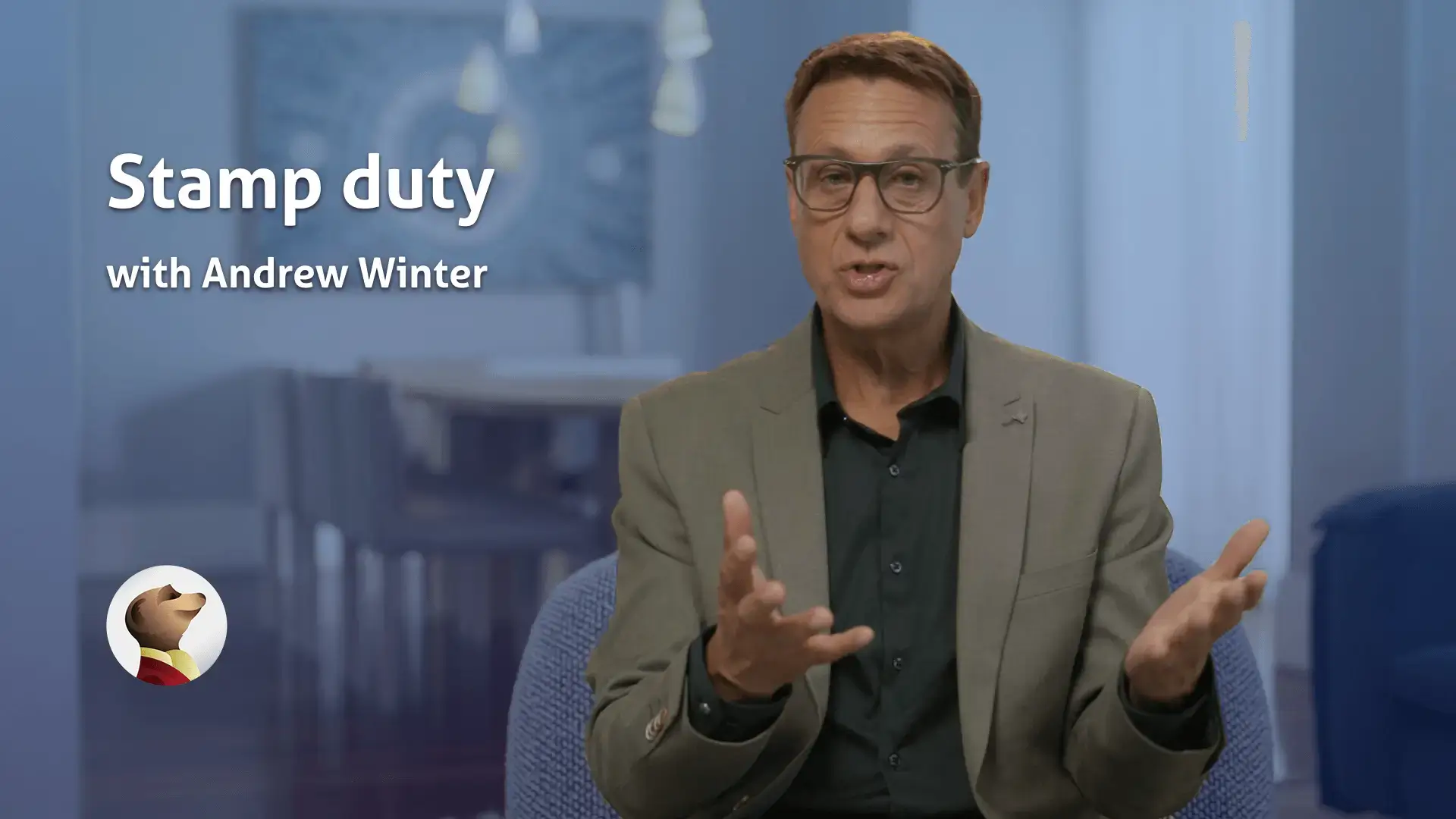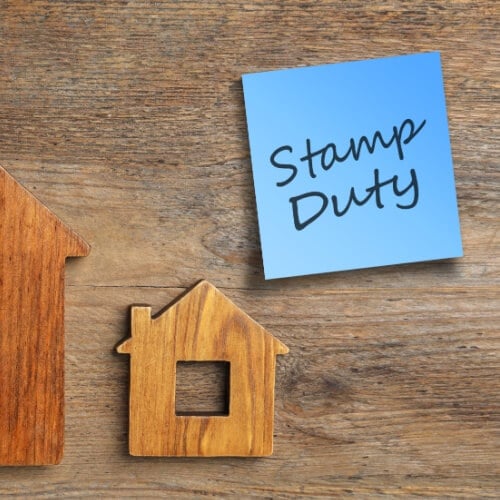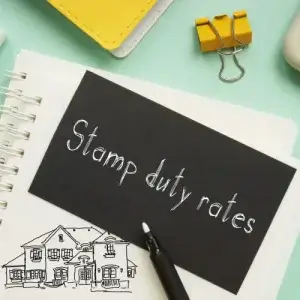Home / Home Loans / Stamp duty calculator

Key takeaways
- Stamp duty is an upfront government fee charged on the transfer of a property’s legal ownership that you’ll need to budget for
- It typically costs homebuyers thousands of dollars and can be one of your largest homebuying costs
- The amount of stamp duty you pay will depend on several factors, but it’s largely tied to the value of the property
- Our new home loan comparison calculator can calculate your payable stamp duty for you, along with the rest of your upfront buying costs
Stamp duty and how it works



Hi, I’m Andrew Winter, host of Selling Houses Australia.
As someone who’s no stranger to the homebuying process, I’m well aware of what kinds of costs
I’ll have to deal with if I buy a property. But there are plenty of homebuying costs that
can catch first home buyers unawares, and the largest of these will typically be your transfer
duty – or ‘stamp duty’ as it’s often called. Stamp duty is a government tax that’s charged
whenever legal ownership of a property is transferred between two parties as part of a sale.
It’ll often cost the buyer – that’s you! – thousands, or even tens of thousands of dollars,
so it’s definitely a cost worth keeping in mind, and budgeting generously for.
Now, each state and territory charges different amounts of stamp duty on
different property value thresholds. So, you’ll need to make sure you’ve
looked at the specific rates and thresholds for where you live, to get an accurate idea
of what your stamp duty bill could look like. When it comes time to pay your stamp duty
which will usually be at settlement – you’ll typically be paying it completely out of pocket. Ouch.
The only exceptions I’d point out would be first home buyers, who are often eligible
for some sort of stamp duty discount or exemption. But even those aren’t guaranteed – you’ll need to
check what’s on offer in your state or territory, as well as with your conveyancer in order to
figure out the applicable government fees. Luckily, Compare the Market can help you
both understand how stamp duty is charged where you live, and then calculate your
payable stamp duty once you’re ready to buy. Their home loan comparison tool lets you specify
the property you’d like to buy, along with what you’re planning on using it for and your
particular buying circumstances, and then tells you how much stamp duty you’d pay on the purchase.
So, whether you’re a first home buyer or a seasoned property expert, Compare the Market
can help you with your next property journey – they make it as easy as comparing home loans.
Stamp duty calculator
Expert stamp duty tips
As General Manager of Money at Compare the Market, Stephen Zeller wants to help make sure home buyers aren’t taken unawares by their stamp duty and have a firm idea of what their stamp duty costs will look like ahead of time. With that in mind, he has some top stamp duty tips for homebuyers:

Factor in your stamp duty
Stamp duty is a cost that’s often overlooked when people are thinking about purchasing a home. If you’re not eligible for any stamp duty concessions or exemptions, be sure to factor in the additional savings needed to cover stamp duty. Alternatively, you can speak to one of our Home Loan Specialists to see if you can add it to your home loan.
Know how much you’ll pay
Feel free to check with one of our Home Loan Specialists regarding your potential eligibility for any stamp duty exemptions or concessions, but also check with your conveyancer or solicitor, as they’ll be responsible for confirming the amount to be charged at settlement.
We can help you calculate your costs
Based on the value of the property you want to buy and where it’s located, our new home loan comparison tool will tell you how much stamp duty you’d be likely to pay on a given property purchase. It will also estimate the rest of your buying costs including government charges, lenders mortgage insurance (if applicable), conveyancing, and inspections. You can also use it to compare a range of home loans you’re eligible for and apply for one if you decide it’s appropriate for you – all in the one place!
Stamp duty explained
What is stamp duty?

Stamp duty is a type of tax imposed on house, vacant land and new build purchases by state and territory governments. Each state and territory has its own stamp duty rates and thresholds, as well as different grants, concessions and exemptions for eligible buyers.
A property buyer will typically have to pay stamp duty whether they’re buying a place of residence or investment property, and regardless of the type of real estate being purchased.
How is stamp duty calculated?
Stamp duty is generally calculated using a set of purchase price thresholds, with each one charging a set base amount of stamp duty plus an additional rate for any amount that exceeds the threshold. Stamp duty can also be offset by certain state-based concessions if you’re a first home buyer.
To calculate stamp duty, you’ll need to find your state’s stamp duty rates and the purchase price or market value of the property you’re eyeing off – also known as the ‘dutiable value’. For the example below, we’ve used Queensland’s stamp duty rates for a house selling for $550,000, and assumed the buyer isn’t eligible for any stamp duty concessions or exemptions.
The calculations begin with Queensland’s stamp duty rate for properties sold for between $540,000 and $1,000,000, which is $17,325 plus $4.50 for every $100 (or part of $100) over $540,000.¹
- A stamp duty calculator will start with the difference between $550,000 and $540,000 ($10,000) and then divide that by $100. In our example, this equals 100.
- The next step is to multiply 100 by $4.50, giving us $450.
- The final step in calculating the stamp duty payable is to add $450 to the base rate ($17,325), giving us a final stamp duty amount of $17,775.
Does stamp duty include GST?
Yes, GST is payable on stamp duty and your stamp duty costs will typically include GST. This is because stamp duty is paid on a property transfer’s gross value (i.e. the total cost), so if your property purchase attracts GST, it will be added to the purchase value and included for the stamp duty calculation.
Stamp duty costs in the states and territories
Want more specific information on how much stamp duty costs in a certain state or territory? We’ve got you covered, with our stamp duty guides for:
Keep in mind that not only will stamp duty thresholds and rates vary by state and territory, but so will concessions on offer for first home buyers. Some states and territories may offer generous stamp duty concessions to first home buyers, while some may not offer any incentives at all.
Who has to pay stamp duty?
Do you need to pay stamp duty for new homes?
Stamp duty will typically apply to the sale of newly built homes, established homes and vacant land. However, if you’re buying vacant land with the intention of building a residential property on it, you’ll only pay stamp duty on the transfer of the existing property title.
Exactly how much stamp duty you’ll have to pay on your property purchase will typically depend on several factors, including:
- The dutiable value of the property
- The state or territory you live in
- Whether it will be your primary residence or an investment property
- If you’re a foreign purchaser
- Whether you’re eligible for any stamp duty concessions.
It’s typically not affected by the type of property you’re buying, meaning you’ll generally pay the same amount whether you’re buying a standalone house or an apartment. Our home loan comparison tool will tell you how much stamp duty you’re likely to pay on a given property purchase, and take the guesswork out for you.
Do first home buyers pay stamp duty?
Parts of Australia have stamp duty exemptions and concessions for first home buyers on top of the First Home Owners Grant (FHOG). For example, in Victoria eligible first home buyers don’t pay stamp duty if the home’s purchase price is below $600,000, and receive a stamp duty concession on properties worth $600,001-$750,000.²
You can learn more about the different state-based concessions for first home buyers and stamp duty by reading the stamp duty guide for your state or territory above.
Do you pay stamp duty for land purchases?
Yes, stamp duty will typically be payable on the transfer of land, as ownership of the land will still need to be legally transferred which incurs a stamp duty cost. However, different jurisdictions may charge different rates of duty on land transactions vs land and building transactions.
Do you pay stamp duty when you sell a house?
Stamp duty is generally payable by the buyer in any property or land transaction. This is the case in every state and territory of Australia – stamp duty is the buyer’s responsibility, and the seller would only pay stamp duty if they purchased another property after selling the first.
Paying your stamp duty
Who is stamp duty paid to?

Stamp duty is paid to the revenue office of your respective state or territory government. However, your lawyer or conveyancer will generally handle the actual payment on your behalf. Be sure to check this, however, as you may incur financial penalties if your stamp duty goes unpaid.
When is stamp duty payable?
Stamp duty is typically paid either after the contract of sale is entered into or the purchase is approved and settled. You’ll generally have a time limit of 30 days to pay any applicable stamp duty; however, this varies depending on your state or territory.
For the vast majority of property transactions, stamp duty will typically be paid at settlement as part of the home loan settlement process. The notable exception is property transactions in which the buyer is making a cash purchase and does not require finance.
Can stamp duty be added to a mortgage?
You’ll typically have to pay your stamp duty upfront at settlement date. Depending on your financial situation, some lenders may let you increase the size of your home loan in line with your stamp duty costs, depending on factors like your borrowing power, loan-to-value ratio (LVR) and the current size of your home loan.
However, if you do so, keep in mind that adding the value of your payable stamp duty to your mortgage will increase the overall size and cost of your home loan, and affect your LVR. It also means you may have larger home loan repayments. Depending on your LVR, you may end up having to pay Lenders Mortgage Insurance (LMI) as well.
Meet our home loans expert, Stephen Zeller
Stephen has more than 30 years of experience in the financial services industry and holds a Certificate IV in Finance and Mortgage Broking. He’s also a member of both the Australian and New Zealand Institute of Insurance and Finance (ANZIIF) and the Mortgage and Finance Association of Australia (MFAA).
Stephen leads our team of Mortgage Brokers, and reviews and contributes to Compare the Market’s banking-related content to ensure it’s as helpful and empowering as possible for our readers.
1 Queensland Government, Transfer duty rates. 2024.
2 State Revenue Office Victoria, First home buyer duty exemption, concession or reduction. 2024.


